Zines are for Everyone
Are zines life? Vicky has done her best to find out. Read about a life in self-publishing, starting Pen Fight Distro, and what the future might bring for working-class zinesters.
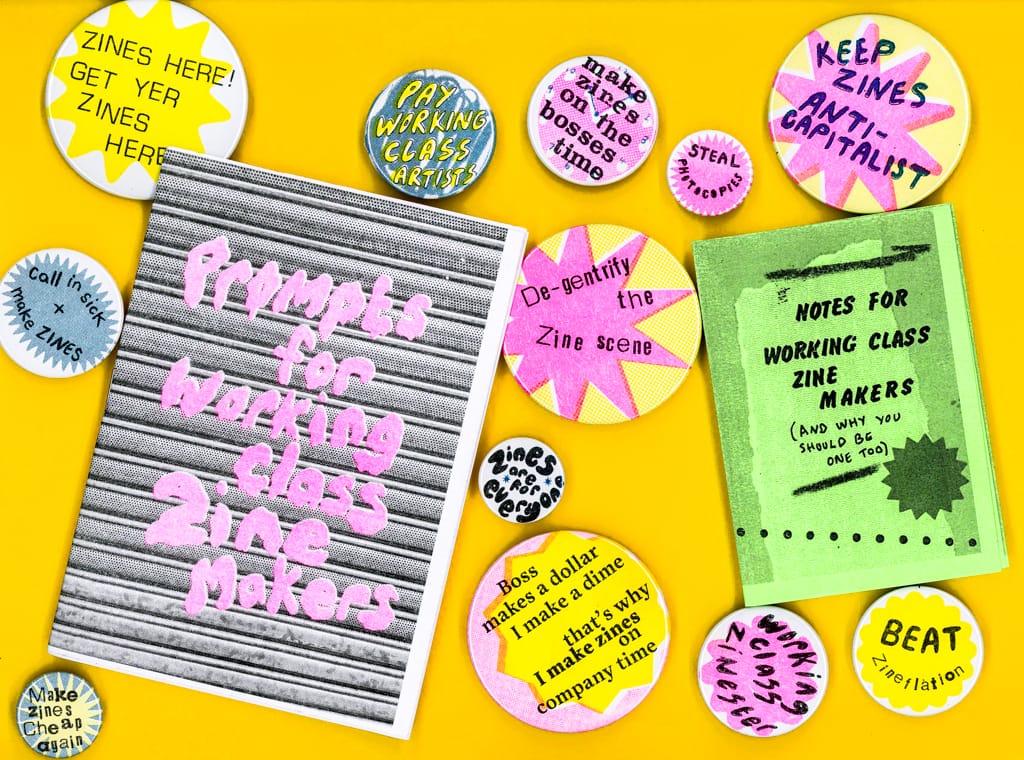
Hello! I'm Vicky, an artist, zine maker, and occasional event organiser.
I finished an illustration degree as a mature student back in 2015, already realising I would probably never want to try and make a career as a full-time illustrator (too stressful, too little money, not being able to afford to be paid in ‘exposure’, wanting more control over my creative work). I moved to Manchester and around horrible temp office jobs set up Pen Fight Distro, something that has evolved over the years but at its core is a queer feminist zine distro and tiny press. The press part is powered by two small (and one very ancient) laser printers that I've carted around with me – from scrappy cheap DIY art studios in the small windows where they managed to exist, to spaces carved out the corner of various flatshares and social-housing, to now where I have the luxury of a dedicated converted-loft room in my current home.
I've been interested in zines since I was a teenager, which is long enough back now that I can't remember too clearly how that all started. What I do remember is buying and trading zines with strangers via Livejournal and Flickr zine groups, and how those zine networks helped me make friends in new cities. Before that, I was a working-class kid growing up in a mining village in the North. For me, zines and the Internet worked hand-in-hand to connect me to new ideas, new politics, and people I wouldn't otherwise come across. They're how I escaped a place where I felt quite isolated and where I was first introduced to feminism and queerness. Zines are still a big part of how I navigate the world.
So back to 2015, I'd been making my own zines for a while, was involved with and tabled zine fairs. I'd just finished a project which was about trading and giving away art for free and the networks that can create. I was inspired by what I'd seen of international folks like Wasted Ink, and Portland Button Works and plenty of other distros that have come and gone over time. I'd been a big fan of Marching Stars too (a UK zine distro) who announced they'd be closing earlier that year, and it just really felt like there weren't enough zine distros in the UK at that time.
I'm a very "make what you want to see out there" person, so I chucked together an online store and contacted some people whose zines I liked and asked if I could distro them. I had a zine fest lined up a few months later (Weirdo Zine Fest at DIY Space for London RIP) so I had the motivation to sew a banner and lino-print and stamp some very handmade business cards.
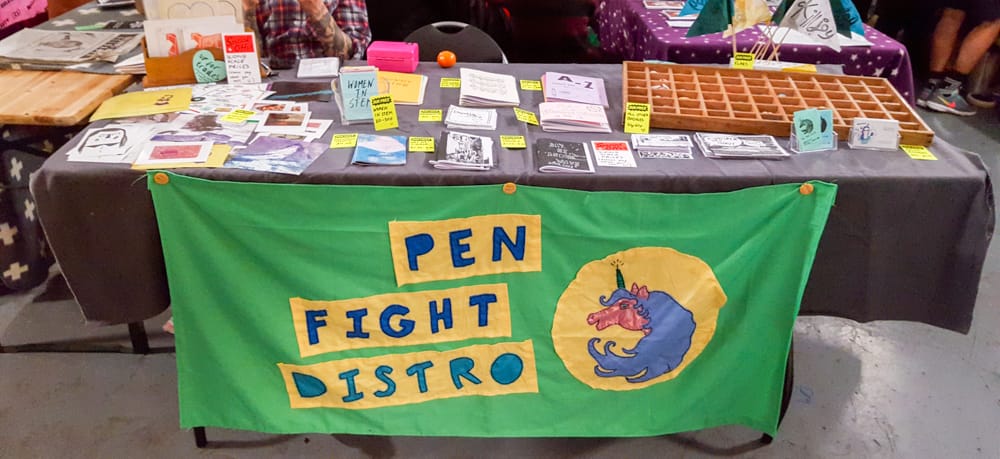
It's been a huge DIY operation from the start and I've kept it that way. I really believe in just giving it a go, making do with that you've got, and outsourcing things as little as possible. Even if it's more time consuming, there's something really great about owning the equipment, learning the skills and being able to have that control of making something yourself. This feels even more urgent in an era where we have just a few companies controlling most of our online time, and where everything is a subscription rather than something you own.
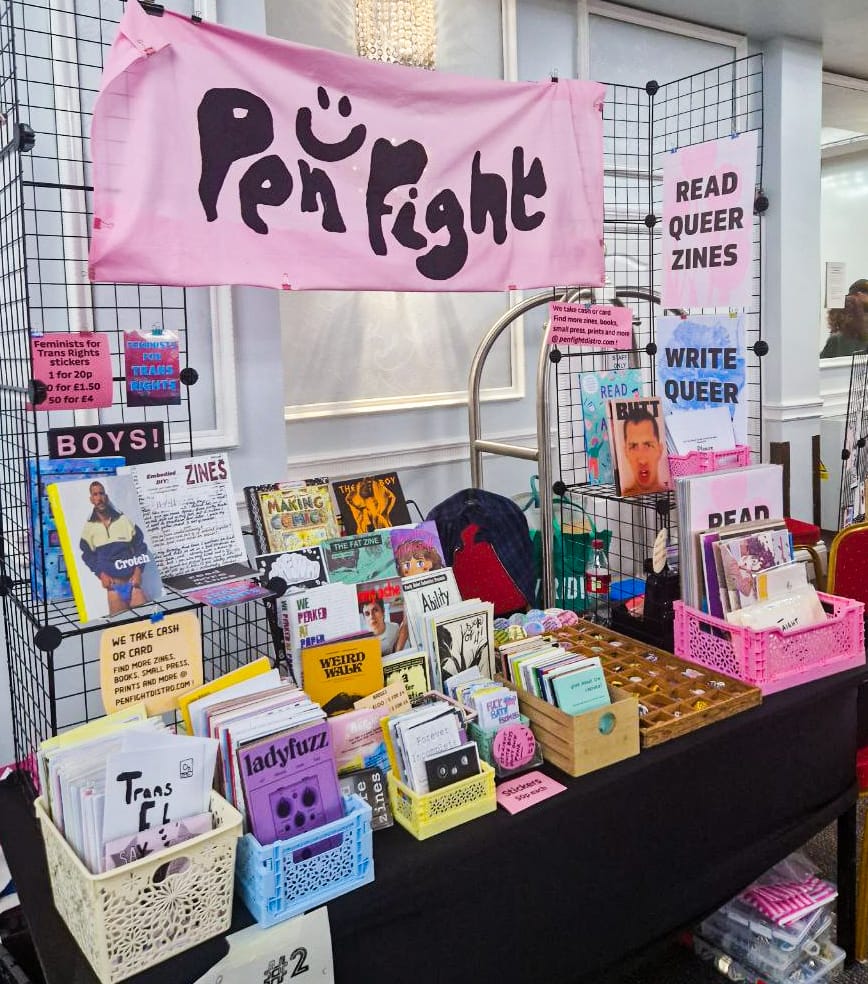
Zines, more than most things in my life, are the thing that have helped me to connect most to others. This ranges from reading a perzine* and getting to hear some really intimate things about a complete stranger even if you never have a conversation with them, to meeting some of my best friends. There's people I see semi-regularly across the country only at zine fairs, people I've got to know through stocking their work, and people I'll spend an hour or two with when I run a zine workshop. When I visit a city the first thing I search for is where I can find zines – it usually points me in right direction for interesting things and good people. It doesn't really matter if they make zines about anarchist theory or about their cat, it all works the same.
* perzine as in personal-zine, a genre of zines that are primarily about personal experiences, thoughts or ideas. They can often look and feel very diary-like.
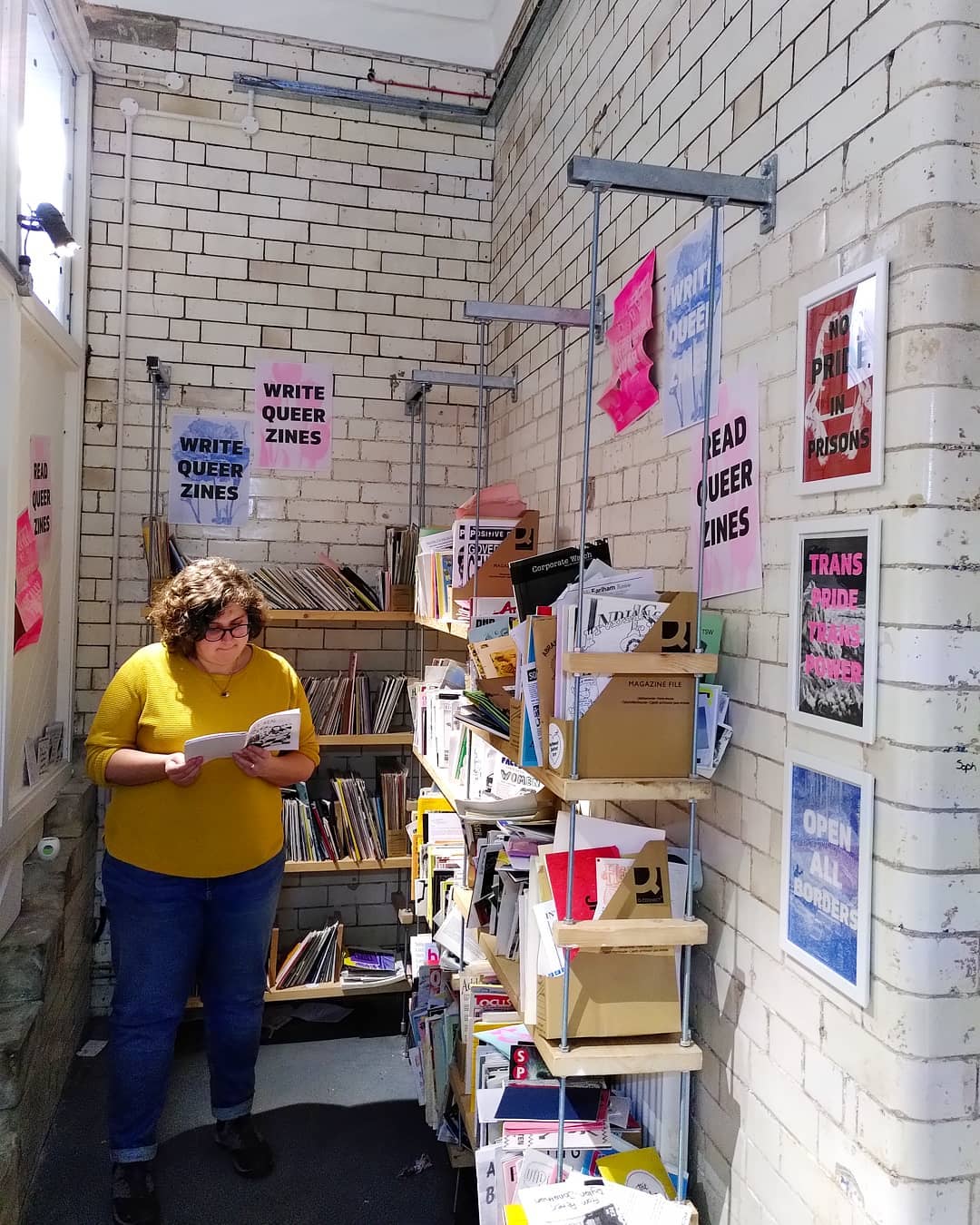
Back when I was deciding where to move to after university ended, visiting Salford Zine Library (which was then based in Manchester city centre in the now-closed Nexus Art Cafe) was a major draw to Manchester for me. I traded mail with one of the people who was running it (along with North-West Zine Fest), and now we're good friends and I help run SZL along with them. It's a volunteer-run and donation-based library of over 5200+ zines and other self-published titles. It's currently living in my bedroom so I can develop the collection, and work towards doing something new with it while putting it back in the community.
Which actually feels a pretty apt place for a zine collection to live. There's this strong relationship between zines and the bedroom, both from the image of the 90's Riot Grrrl zine maker cut-and-pasting on their bedroom floor to the literal beds of sick and disabled zine makers that Lea Cooper writes about here. But these bedrooms aren't isolated places. DIY and left-wing physical venues are struggling to exist thanks to landlordism and sky-high rents but I think zines still offer a way for us to come together and find each other, and escape the current Bad Vibes of the Internet: control of speech, algorithms, and whims of massive social media companies.
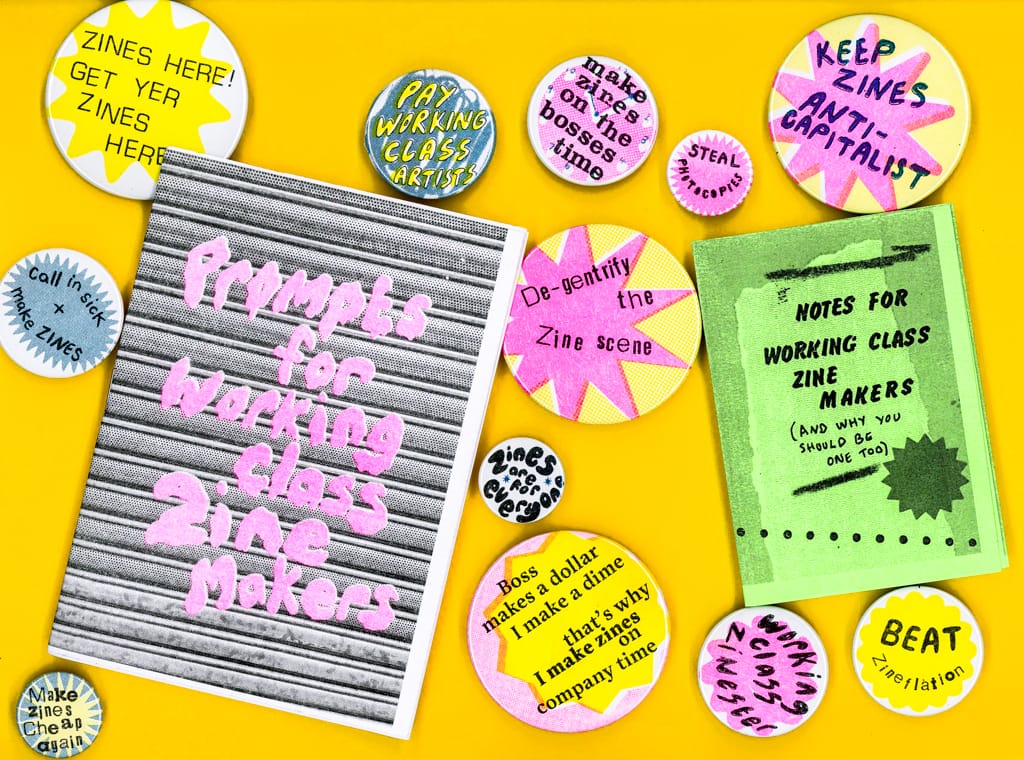
Right now I'm part-way through a larger project about encouraging and supporting more working class zine makers - kicked off thanks to doing an artists residency with Grrrl Zine Fair (lead by fellow working class zine legend Lu Williams).
My relationship with zines has undoubtedly been shaped by my own working-class-ness. They've always been a outlet to make things on a small budget, and the small-scale, low-stakes of a distro meant I could start it with just a tiny bit of my own money, zero other funding, just growing it incredibly slowly by putting profits back into buying more stock and equipment to make things. It's allowed me to create something that works by my own values, where I've been able to do things like sell on a sliding-scale, raise money for trans-led causes and gift hundreds of free books to trans people – something I could have never been able to afford to do just on my own!
Despite all the potential of zines, working-class makers and explicitly working-class zines are frustratingly sparse. The zine scene in the UK can be very white, which why things like Over Here Zine Fest in Manchester are so important. There's been some bloody brilliant working-class zinesters and projects around like Poor Lass and Working Class Queers to name just a couple.
I've seen a shift in zine culture over the last few years, of professionalisation, higher print quality, higher prices, resulting in a bit of a loss of that rough DIY nature and an emphasis on trading zines and supporting each other. None of that can be helping, if working-class people new to zines are getting the impression that you need this big pot of funds and fancy software and an art degree to even get a zine made. It doesn't have to be that way at all.
Pen Fight officially turns 10 years old this November, which in DIY and zine terms makes it almost ancient. I'll be taking a moment to celebrate that milestone by throwing a birthday party as part of Information Lives in DIY culture at at SODA (School of Digital Arts) at Manchester Metropolitan University, organised by Kirsty Fife (another working class zinester fave!). Along with some surprises I'll be doing a zine launch, some speed-friending (and zine trading), and will be bringing a pop-up library from Salford Zine Library. GFSC's Kim is going to be there too!
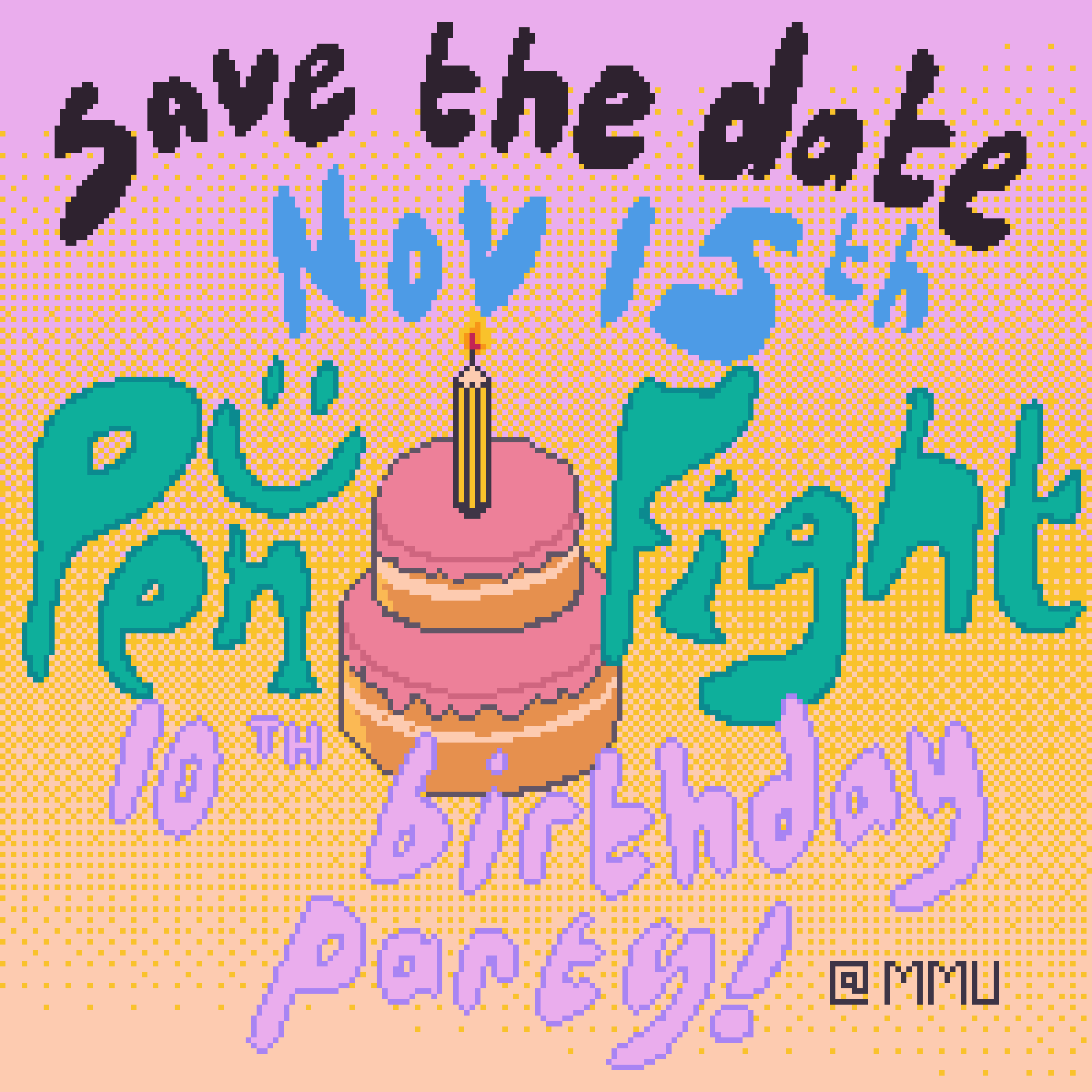

Tickets for the full event have already sold out, but you're still welcome to come along to Pen Fight's party without one. See Pen Fight's website for more information - and hope to see you there!


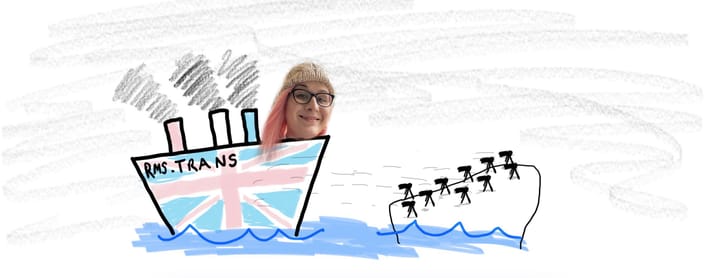
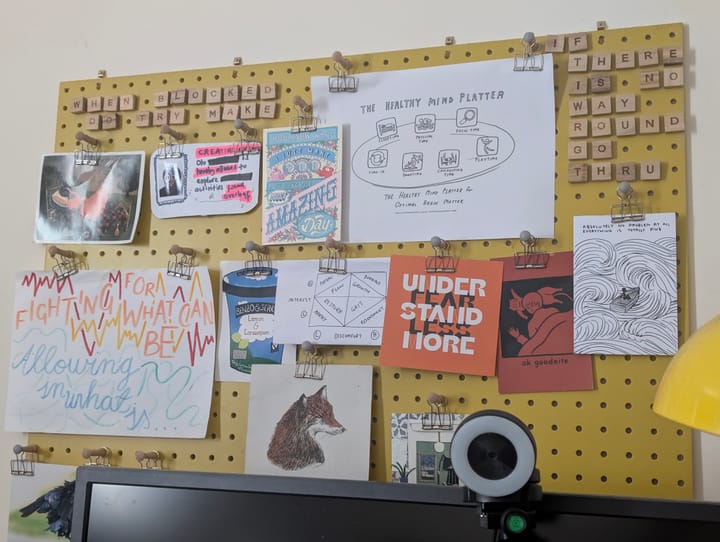
Comments ()